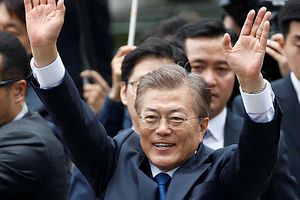Observers in South Korea and the United States have grown anxious over the potential for friction between Presidents Moon Jae-in and Donald Trump. The two countries enjoyed a relatively peaceful and cooperative relationship during the Obama-Lee and Obama-Park eras. Both Obama and his two successive counterparts in Seoul touted that the ROK-U.S. alliance couldn’t get any better. However, this did not imply that the relationship was without its problems. On several occasions, South Korea and the United States had noticeable differences in their policy agendas. For example, the Obama administration was dissatisfied with South Korea regarding the full implementation of the South Korea-United States Free Trade Agreement (KORUS FTA) and South Korea’s active involvement in territorial issues in the South China Sea.
When former President Park Geun-hye visited Beijing in 2015 to celebrate the 70th anniversary of the end of World War II, the United States frowned upon her attendance even though its official comments remained neutral. Washington was also frustrated with Park’s reluctance to deploy the American missile defense system known as Terminal High Altitude Area Defense (THAAD) on South Korean soil to defend against North Korea’s growing missile threat. Even though the two governments went through occasional rough patches, however, they never questioned the each other’s fundamental commitment to the alliance.
This changed in the second half of 2016 when South Koreans began to have serious concerns about the relationship. On the campaign trail, Trump publicly criticized the United States’ one-sided relationship with South Korea. In his speeches and Twitter feed, Trump labeled the KORUS FTA as an unfair deal because of the large American trade deficit with South Korea. He went on to say that the United States would provide security and defense only if South Korea paid for American services. This led many South Koreans to believe that Trump was undervaluing the long-standing alliance.
In the meantime, Park’s involvement in an influence-peddling scandal incapacitated South Korea’s leadership. Her impeachment forced South Korea to remain on the sidelines when Trump was elected president.
With the beginning of the Moon presidency, many foresee potential for friction on a number of critical issues including THAAD, military burden-sharing, KORUS FTA, and North Korea policy.

































